Lizhi Ma
LeJOT: An Intelligent Job Cost Orchestration Solution for Databricks Platform
Dec 20, 2025Abstract:With the rapid advancements in big data technologies, the Databricks platform has become a cornerstone for enterprises and research institutions, offering high computational efficiency and a robust ecosystem. However, managing the escalating operational costs associated with job execution remains a critical challenge. Existing solutions rely on static configurations or reactive adjustments, which fail to adapt to the dynamic nature of workloads. To address this, we introduce LeJOT, an intelligent job cost orchestration framework that leverages machine learning for execution time prediction and a solver-based optimization model for real-time resource allocation. Unlike conventional scheduling techniques, LeJOT proactively predicts workload demands, dynamically allocates computing resources, and minimizes costs while ensuring performance requirements are met. Experimental results on real-world Databricks workloads demonstrate that LeJOT achieves an average 20% reduction in cloud computing costs within a minute-level scheduling timeframe, outperforming traditional static allocation strategies. Our approach provides a scalable and adaptive solution for cost-efficient job scheduling in Data Lakehouse environments.
PsyGUARD: An Automated System for Suicide Detection and Risk Assessment in Psychological Counseling
Sep 30, 2024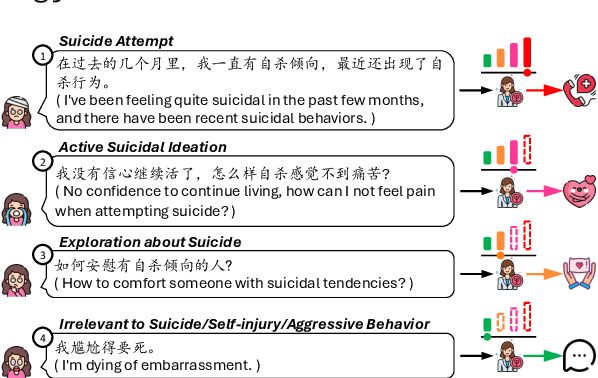

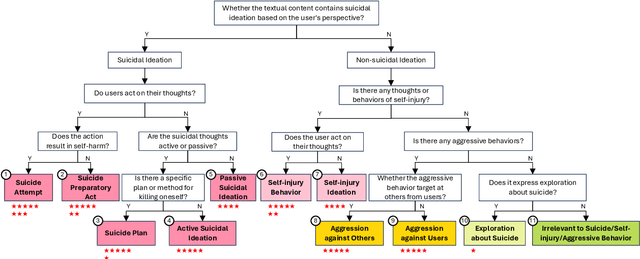
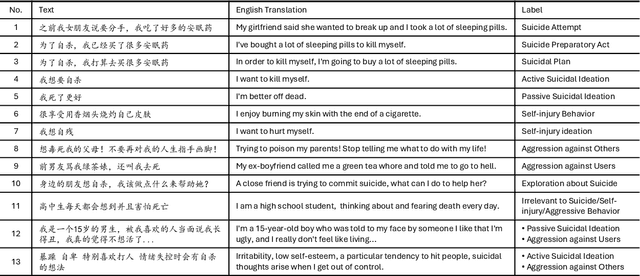
Abstract:As awareness of mental health issues grows, online counseling support services are becoming increasingly prevalent worldwide. Detecting whether users express suicidal ideation in text-based counseling services is crucial for identifying and prioritizing at-risk individuals. However, the lack of domain-specific systems to facilitate fine-grained suicide detection and corresponding risk assessment in online counseling poses a significant challenge for automated crisis intervention aimed at suicide prevention. In this paper, we propose PsyGUARD, an automated system for detecting suicide ideation and assessing risk in psychological counseling. To achieve this, we first develop a detailed taxonomy for detecting suicide ideation based on foundational theories. We then curate a large-scale, high-quality dataset called PsySUICIDE for suicide detection. To evaluate the capabilities of automated systems in fine-grained suicide detection, we establish a range of baselines. Subsequently, to assist automated services in providing safe, helpful, and tailored responses for further assessment, we propose to build a suite of risk assessment frameworks. Our study not only provides an insightful analysis of the effectiveness of automated risk assessment systems based on fine-grained suicide detection but also highlights their potential to improve mental health services on online counseling platforms. Code, data, and models are available at https://github.com/qiuhuachuan/PsyGUARD.
Predicting the Big Five Personality Traits in Chinese Counselling Dialogues Using Large Language Models
Jun 25, 2024Abstract:Accurate assessment of personality traits is crucial for effective psycho-counseling, yet traditional methods like self-report questionnaires are time-consuming and biased. This study exams whether Large Language Models (LLMs) can predict the Big Five personality traits directly from counseling dialogues and introduces an innovative framework to perform the task. Our framework applies role-play and questionnaire-based prompting to condition LLMs on counseling sessions, simulating client responses to the Big Five Inventory. We evaluated our framework on 853 real-world counseling sessions, finding a significant correlation between LLM-predicted and actual Big Five traits, proving the validity of framework. Moreover, ablation studies highlight the importance of role-play simulations and task simplification via questionnaires in enhancing prediction accuracy. Meanwhile, our fine-tuned Llama3-8B model, utilizing Direct Preference Optimization with Supervised Fine-Tuning, achieves a 130.95\% improvement, surpassing the state-of-the-art Qwen1.5-110B by 36.94\% in personality prediction validity. In conclusion, LLMs can predict personality based on counseling dialogues. Our code and model are publicly available at \url{https://github.com/kuri-leo/BigFive-LLM-Predictor}, providing a valuable tool for future research in computational psychometrics.
Automatic Evaluation for Mental Health Counseling using LLMs
Feb 19, 2024

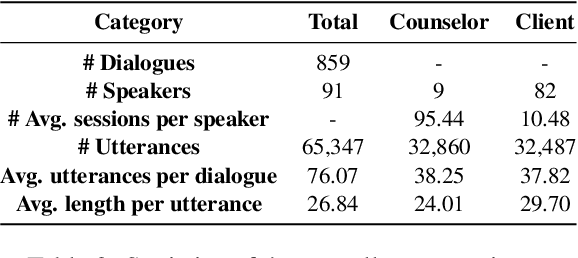

Abstract:High-quality psychological counseling is crucial for mental health worldwide, and timely evaluation is vital for ensuring its effectiveness. However, obtaining professional evaluation for each counseling session is expensive and challenging. Existing methods that rely on self or third-party manual reports to assess the quality of counseling suffer from subjective biases and limitations of time-consuming. To address above challenges, this paper proposes an innovative and efficient automatic approach using large language models (LLMs) to evaluate the working alliance in counseling conversations. We collected a comprehensive counseling dataset and conducted multiple third-party evaluations based on therapeutic relationship theory. Our LLM-based evaluation, combined with our guidelines, shows high agreement with human evaluations and provides valuable insights into counseling scripts. This highlights the potential of LLMs as supervisory tools for psychotherapists. By integrating LLMs into the evaluation process, our approach offers a cost-effective and dependable means of assessing counseling quality, enhancing overall effectiveness.
PsyChat: A Client-Centric Dialogue System for Mental Health Support
Dec 07, 2023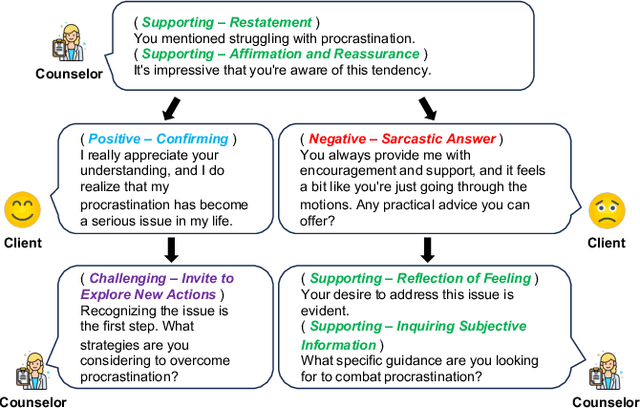

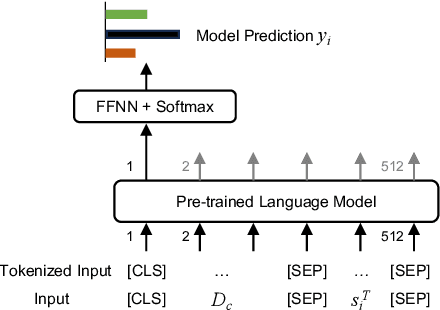
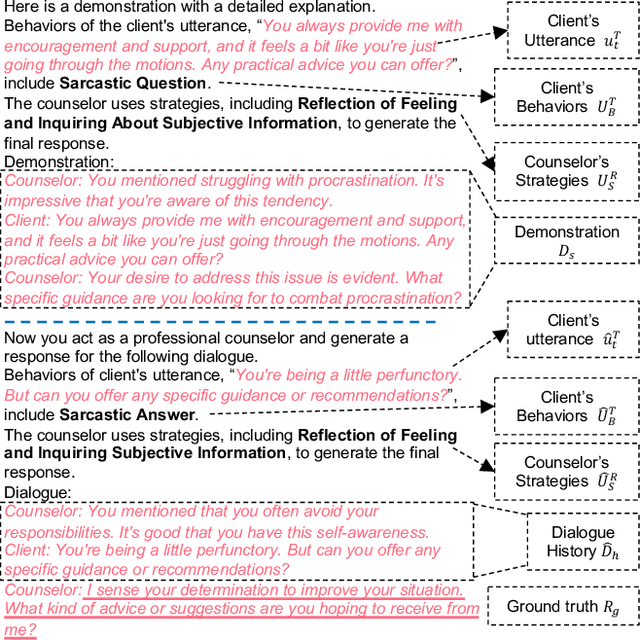
Abstract:Dialogue systems are increasingly integrated into mental health support to help clients facilitate exploration, gain insight, take action, and ultimately heal themselves. For a dialogue system to be practical and user-friendly, it should be client-centric, focusing on the client's behaviors. However, existing dialogue systems publicly available for mental health support often concentrate solely on the counselor's strategies rather than the behaviors expressed by clients. This can lead to the implementation of unreasonable or inappropriate counseling strategies and corresponding responses from the dialogue system. To address this issue, we propose PsyChat, a client-centric dialogue system that provides psychological support through online chat. The client-centric dialogue system comprises five modules: client behavior recognition, counselor strategy selection, input packer, response generator intentionally fine-tuned to produce responses, and response selection. Both automatic and human evaluations demonstrate the effectiveness and practicality of our proposed dialogue system for real-life mental health support. Furthermore, we employ our proposed dialogue system to simulate a real-world client-virtual-counselor interaction scenario. The system is capable of predicting the client's behaviors, selecting appropriate counselor strategies, and generating accurate and suitable responses, as demonstrated in the scenario.
PsyBench: a balanced and in-depth Psychological Chinese Evaluation Benchmark for Foundation Models
Nov 17, 2023Abstract:As Large Language Models (LLMs) are becoming prevalent in various fields, there is an urgent need for improved NLP benchmarks that encompass all the necessary knowledge of individual discipline. Many contemporary benchmarks for foundational models emphasize a broad range of subjects but often fall short in presenting all the critical subjects and encompassing necessary professional knowledge of them. This shortfall has led to skewed results, given that LLMs exhibit varying performance across different subjects and knowledge areas. To address this issue, we present psybench, the first comprehensive Chinese evaluation suite that covers all the necessary knowledge required for graduate entrance exams. psybench offers a deep evaluation of a model's strengths and weaknesses in psychology through multiple-choice questions. Our findings show significant differences in performance across different sections of a subject, highlighting the risk of skewed results when the knowledge in test sets is not balanced. Notably, only the ChatGPT model reaches an average accuracy above $70\%$, indicating that there is still plenty of room for improvement. We expect that psybench will help to conduct thorough evaluations of base models' strengths and weaknesses and assist in practical application in the field of psychology.
Understanding Client Reactions in Online Mental Health Counseling
Jun 27, 2023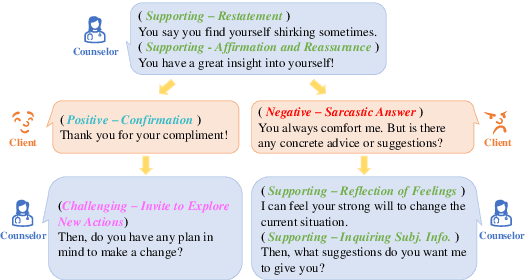
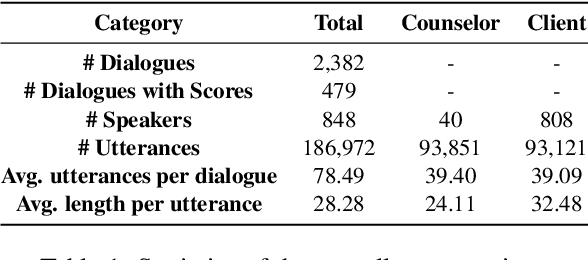
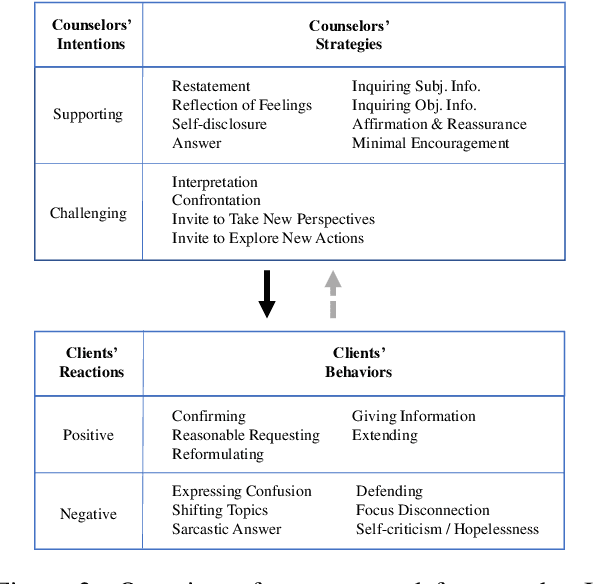
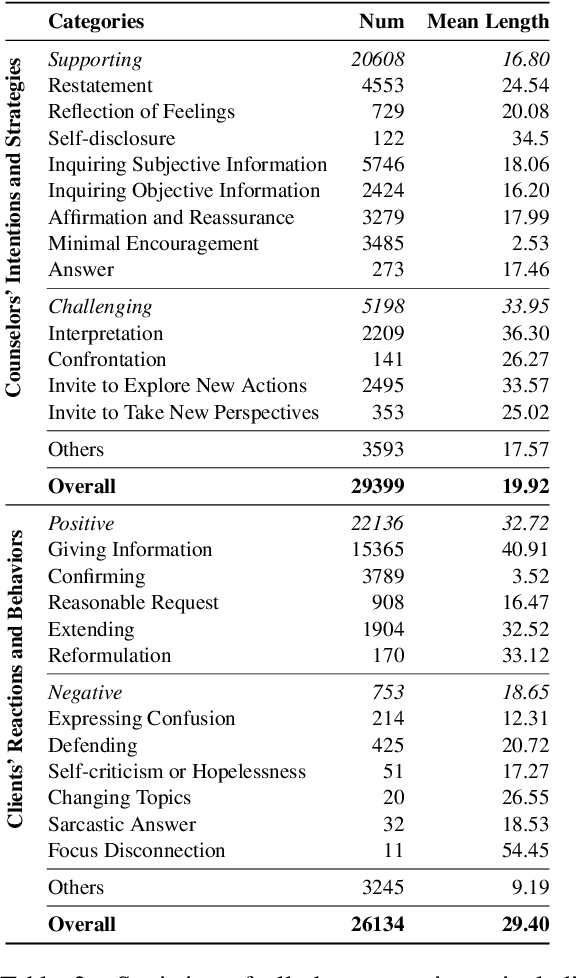
Abstract:Communication success relies heavily on reading participants' reactions. Such feedback is especially important for mental health counselors, who must carefully consider the client's progress and adjust their approach accordingly. However, previous NLP research on counseling has mainly focused on studying counselors' intervention strategies rather than their clients' reactions to the intervention. This work aims to fill this gap by developing a theoretically grounded annotation framework that encompasses counselors' strategies and client reaction behaviors. The framework has been tested against a large-scale, high-quality text-based counseling dataset we collected over the past two years from an online welfare counseling platform. Our study shows how clients react to counselors' strategies, how such reactions affect the final counseling outcomes, and how counselors can adjust their strategies in response to these reactions. We also demonstrate that this study can help counselors automatically predict their clients' states.
Towards Automated Real-time Evaluation in Text-based Counseling
Mar 07, 2022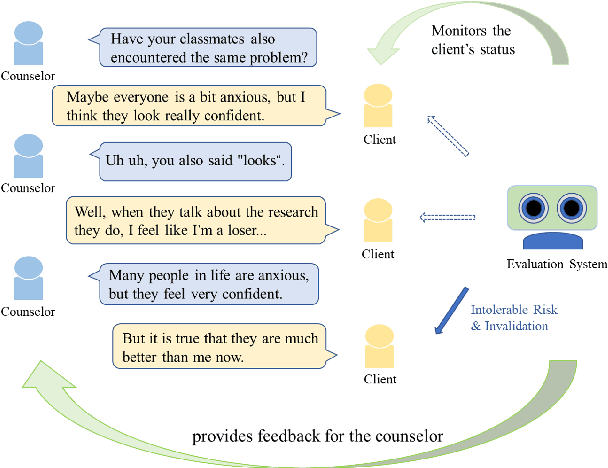
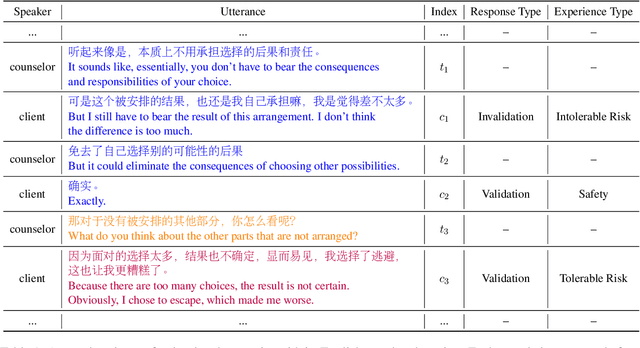
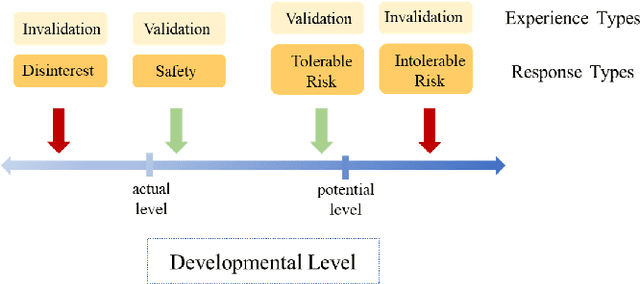

Abstract:Automated real-time evaluation of counselor-client interaction is important for ensuring quality counseling but the rules are difficult to articulate. Recent advancements in machine learning methods show the possibility of learning such rules automatically. However, these methods often demand large scale and high quality counseling data, which are difficult to collect. To address this issue, we build an online counseling platform, which allows professional psychotherapists to provide free counseling services to those are in need. In exchange, we collect the counseling transcripts. Within a year of its operation, we manage to get one of the largest set of (675) transcripts of counseling sessions. To further leverage the valuable data we have, we label our dataset using both coarse- and fine-grained labels and use a set of pretraining techniques. In the end, we are able to achieve practically useful accuracy in both labeling system.
 Add to Chrome
Add to Chrome Add to Firefox
Add to Firefox Add to Edge
Add to Edge